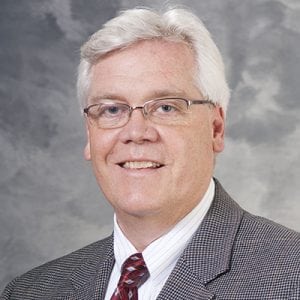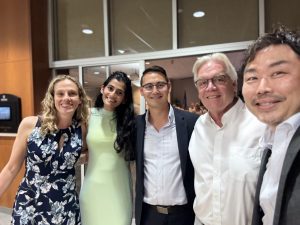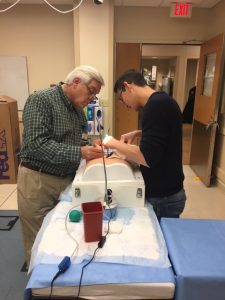
It’s unusual for anyone to spend their entire professional career at one organization, let alone a highly successful surgeon, but Dr. John Hoch is one of those rare cases. Following the completion of his fellowship in vascular surgery at the University of Missouri, Dr. Hoch settled into a faculty role at the Wisconsin Department of Surgery in 1991. Thirty-four years later, he still calls Madison home.
“We’re very fortunate here in that Dr. Belzer (chair of the UW Department of Surgery when Dr. Hoch was hired) built a department of where the Wisconsin Idea plays a role giving back to the community, which I really liked,” Hoch said. “We were also very fortunate that in this department, people got along with each other. Plus it is really a fun place to live. Madison is a wonderful city and a great place to raise a family.”
The impact Dr. Hoch had on the Department of Surgery, the Division of Vascular Surgery and the UW Health system is unquestioned. On the clinical side, in collaboration with Anne Rose from UW Health Pharmacy, Dr. Hoch helped to create and establish the current anticoagulation stewardship program for the entire health system. The program offers prophylaxis guidelines on treating venous thromboembolism, a condition where blood clots form in a vein and the number one preventable complication of hospitalized patients. The program has been recognized nationally, with the Centers for Disease Control awarding a citation for healthcare associated VT prevention in 2015.
“It certainly was a collaborative effort and we’ve been able to, to the credit of the institution, maintain our high rate of prophylaxis and relatively low rates of venous thromboembolism that can be prevented,” Hoch said.

Dr. Hoch specialized in vascular surgery, with particular expertise in complex aortic and visceral artery disease, carotid artery stenting, and minimally invasive treatments for varicose veins and aortic aneurysms. Over the course of his career, he held numerous leadership roles that shaped the direction of vascular care at UW Hospital and the William S. Middleton VA Hospital. He served as Chief of Vascular Surgery, Director of the Surgical Intensive Care Unit, and Director of the Noninvasive Peripheral Vascular Laboratory. He also founded and led the VA’s Smoking Cessation Clinic for over two decades. During that time he became known for his emphasis on the power of positive thinking.
“Attention to detail is such a critical part of what we do. When you work on blood vessels, there’s virtually no room for error,” Hoch said. “And so you could tend to at times become somewhat pessimistic about things when patients are very complicated. Some years ago I started speaking out loud, trying to reinforce to myself that we need to be positive, we need to think of the good side and what the good outcomes can be, not just the tough outcomes for patients. And so that was the power of positive thinking that I became known for.”
Upon his arrival at UW, Dr. Hoch established a vascular biology lab, something that Dr. Belzer and Dr. William Turnipseed, then the Chief of the Division of Vascular Surgery, supported. That commitment played a big role in Dr. Hoch accepting the role.
“I was fortunate early in my training to get the support of our department to fund the fund the basic research I had an interest in,” Hoch said. “I was lucky to have about 15 years of federal funding for my lab. And I was proud of the work we did and certainly proud of creating work and exploring new ideas with a broad range of people I worked with in laboratory and collaborated with.”

As accomplished as he was clinically and in the research space, Dr. Hoch’s true passion was education. He established the vascular surgery fellowship program at UW in 1999 and then helped start one of the first vascular surgery residency programs in the country in 2010. He served as the program director for both training programs until 2019.
“Education is probably one of the most rewarding things I’ve done in my career,” Hoch said. “Watching residents and fellows turn into well-trained vascular surgeons going forward, watching them grow more confident and become capable gives me immense pride.”
In his retirement, Dr. Hoch is looking forward to spending time with his wife, Val, their three daughters and their grandchildren. He hopes to stay involved in the department, especially education both here and abroad. A veteran of a number of global surgery rotations, he is hoping for opportunities to continue that mission, with the help of good friend Dr. Girma Tefera, currently a professor in the Division of Vascular Surgery and the first graduate of the fellowship Dr. Hoch established in 1999.
Those bonds and friendships are one the things Dr. Hoch cherished about working at the UW Department of Surgery and one of the things he will miss most.
“This has been a career where I’ve made friends with all my partners and colleagues and they’ve always had my back and I’ve tried to have theirs,” Hoch said. “As a group we work really well together and I certainly would like to thank them all for that.”